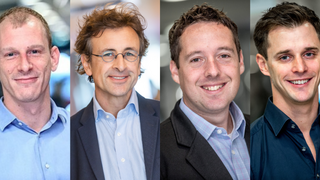“We worked everything out in our own time and also teach for free. There are no other costs involved. Turns out, despite course manuals and accreditation procedures, the only ingredients necessary for a successful course are people willing to teach and people willing to learn.”
- Florian Madertoner, lecturer at RSM
How it all started
RSM lecturers Florian Madertoner, Dr Joop Huij, Dr Marta Szymanowska and Dr Maciej Szymanowski created a 12-week programme in business fundamentals for Ukrainian students currently living in the Netherlands as refugees.
Joop initially approached Florian, Maciej and Marta with the idea for a condensed business programme. In agreement with his idea, the group began by working with Iryna – their Ukrainian contact via Prof. Michel Lander – to formulate questionnaires. “We wanted to find out about students’ study backgrounds, interests and whether they might want to participate in this kind of unaccredited programme,” says Joop.
Florian continues, “We created questionnaires, printed them out and distributed them among the refugees. Iryna collected the questionnaires on behalf of our group. Using their mobile phone numbers, we could immediately add them to our new WhatsApp group and stay in direct contact. From that moment on, we could add interested students to the app group.”
Ready to go!
Half a year after the initial idea, Florian, Joop, Maciej and Marta could work out the scheduling and start the programme. As most of the students have day jobs, the group meets every Wednesday evening from 18:00-21:00.
“RSM’s finance department has provided a moderate catering budget and we can use a classroom on campus. The students are hardworking, curious and just an overall pleasure to work with,” says Florian, whose regular students have repeatedly voted for him as their favourite professor in the student-organised Professor Awards.
Covering the basics
“From our research,” tells Florian, “my colleagues and I found that it’s essential in the post-war rebuilding of a country that that country’s students and graduates can immediately put their knowledge to work. This is why Joop, Maciej, Marta and I wanted to convey the things that are relevant in business in one compressed programme.”
Maciej teaches marketing; Marta takes on introduction to asset pricing; financial markets is taught by Joop; and Florian teaches business basics – entrepreneurship, accounting and finance. “Finance works the same everywhere. I’m teaching the language of accounting and how to apply it in a finance perspective.”
The final project
At the end of the 12-week programme, each student presented their full business plan for either a fictive or a real business. Their presentations will be critiqued not only by their cohort and the four lecturers, but also by visiting industry professionals.
Asked how he thinks students’ final projects will benefit Ukraine and other countries, Florian responds, “Currently, a problem exists, and these students see viable solutions to that problem. They are constructing socially relevant business projects such as providing more education, food, catering services and transport for the Ukraine once the war has ended.”
An added bonus for Florian, Joop, Maciej and Marta: several of the students have expressed an interest in enrolling in one of RSM’s full-time programmes when the current 12-week programme has concluded. The lecturers hope that this course has helped the refugees here and will inspire other schools to do the same.



